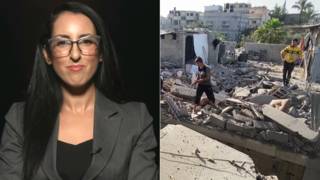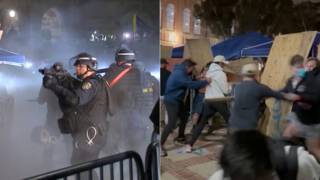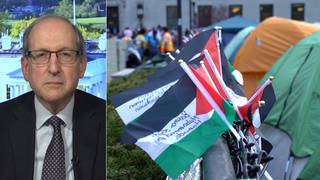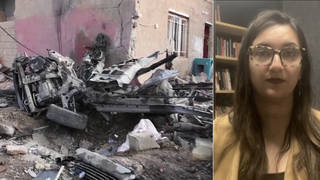
We go to Baghdad to speak with Guardian reporter Jamie Wilson. He recently wrote an article titled “Basra simmers in the heat while tempers boil over” that looks at the constant blackouts in post-Hussein Iraq. He talks about how Iraqis understand all too well what New Yorkers are going through now. [Includes transcript]
The article begins:
“If Iraq has had it bad over the past three decades, then Basra has had it the worst. Parts of the Iran-Iraq war were fought virtually at the gates of the city. In 1991 an estimated 250,000 people died in the uprising against former Iraqi president Saddam Hussein.
As a punishment the regime left the city to rot, and it shows. The buildings are crumbling, and the canals, which once led to the city being compared favorably to Venice, are filled with rubbish.
The city was due a bit of good luck, and most people thought the British and the Americans would bring it.
But four months on things are, many say, no better, and whether by political design or through pure frustration exaggerated by the intense heat, some citizens decided at the weekend that it was time to have a say.
The riots began on Saturday at a petrol station in Sahht Square, a large open expanse of wasteland described by one British official as the city’s answer to Belfast’s Crumlin Road.
Tuesday, back at Red Six, the soldier’s codeword for the petrol station, there was no rioting, but among some of the drivers of the 400 or so vehicles waiting to fill up there was not much sign of the anger and resentment having gone away.
The Coalition Provisional Authority (CPA) is using more than 6 million liters of fuel confiscated from three smuggling barges seized in the Shatt al-Arab waterway to increase supplies of petrol to Basra, but the pumps were dry in Sahht Square. The CPA says vandals have torn down electricity lines and blames the power problems in the city on the outdated and badly maintained 1970s infrastructure.
But some residents are in no doubt that others are the cause of the problems. Sabri Zugheyer, 45, a restaurant owner, who needed fuel for his generator so that he could open up, said: “The British promised to make everything better, but now it’s worse. Even in the old days it was never as bad as this. Their promises are worth nothing.”
- Jamie Wilson, Guardian reporter speaking from Baghdad.
TRANSCRIPT
AMY GOODMAN: .and that’s some of the noise at Union Square, where, yes it was festive. But people have to be very careful, people should definitely be checking on their neighbors. People who in any way are handicapped or elderly, make sure you’re checking in. These are also very very hot days, and we have to make sure that everyone is safe. You know, as we went around, and we’re going to hear a lot from the producers, and the staff of Democracy Now, to give us a sense of everything that’s been going on. It really made me think about Iraq. We’re talking about high temperatures, and we’re talking about lack of electricity, and, to say the least, people’s quote, “business as usual” being interrupted. I was watching CNN a couple of weeks ago, a program on Saturday morning, and one of the reporters asked the reporter in Baghdad, she said, you know, we really have to ask, and a lot of people are asking it in this country, we gave you liberation, and yet, you’re talking about electricity. What do these people want, saying that they are ungrateful, talking about the Iraqi people. Well, we’re joined on the telephone right now, by a guest who has been covering major protest in Basra, is now in Baghdad. He is Jamie Wilson, and he reports for the Guardian newspaper. Welcome to Democracy Now.
JAMIE WILSON: Hi, how are you doing.
AMY GOODMAN: It’s good to have you with us. Unusual circumstances today. We’re here with candles that light our studio, in the power hub, perhaps, of the world, New York. As you’ve heard, the biggest blackout in American history. Can you talk about some of the similarities right now.
JAMIE WILSON: Yeah, I mean, I can tell you that the irony hasn’t been entirely lost on some of the Iraqi people I’ve been talking to this morning. They’ve obviously heard about what’s been happening in America on sort of BBC World and various other radio stations here. And, I have to say, some of them are actually finding it quite funny, these people who’ve been without power for months and months now. And I think — certainly my driver said to me this morning, that perhaps now that Baghdad could donate some electricity to America to try and help sort out the problems. I mean, the people here are basically living with three hours on, three hours off, is how the system is working at the moment. It is better than it was, I think, a few months ago just after the war finished, when I think power was up to 30% of demand. It’s now up to probably somewhere around about 60% or 70% I guess. But still, most people in Baghdad are having to cope with three hours of electricity followed by three hours of no electricity, which in 50 degree Celsius heat, I’m not quite sure what that is in Fahrenheit, but I think I can tell you, it’s no fun for most of these people. Most of them don’t have air conditioning anyway, but more of them do have fans, that just take the edge off that temperature at night, particularly when they’re trying to sleep. And with no electricity, it really isn’t much fun for these people.
AMY GOODMAN: And that comment that the CNN reporter made, asking, isn’t there a certain level of ungratefulness here? We liberated the people of Iraq. What more do they want, and yet they’re talking about electricity.
JAMIE WILSON: Well, I think electricity goes to the heart of everything, really. It’s so important, as I’m sure you guys are realizing today, Without it, life doesn’t really, it’s very difficult for life to go on as normal. Especially in these temperatures, without refrigeration and without the fans that I was talking about. So, you know, for these people, they can’t live without electricity, as I’m sure you guys are finding out. So, I think that’s a pretty harsh comment to make.
AMY GOODMAN: Can you describe again for our listeners, what happened in Basra when you were there.
JAMIE WILSON: As a matter of fact, there was quite a lot of rioting in Basra, last weekend, some very serious rioting. Actually, about 2000 people took to the streets. It was a combination of a few things, really, coming together. One, incredibly high temperatures, last weekend, and humidity in Basra, and basically for most of the weekend there was a complete power blackout. Some of it was due to saboteurs taking copper from the electricity lines, but basically, just a huge demonstration that meant the infrastructure of the country couldn’t cope, and so, most of the city was left without electricity in these horrendous temperatures. Added to that, because of no electricity, the oil refinery couldn’t produce any gas, so people couldn’t get fuel for their cars, but, more importantly, they couldn’t get fuel for their generators, either. Because a lot of people do have generators and might maybe put a generator in the street that people will pay — owned privately — that people will pay to hook up to you, but when the power goes down, it means at least they can get power from a generator, even if it isn’t infinite, and not as much power as the would normally get. So, for the lack of gas when they couldn’t fuel up these generators, they really were left in a pretty dire situation. And that led to, you know, quite severe rioting, down in Basra. And that, you know, was just a reflection, really, of how bad that situation was getting.
AMY GOODMAN: Well, I want to thank you, Jamie Wilson. The news we also have out of Iraq now, while we have you on, the U.S. has apologized to Shiite Muslims in Iraq for knocking down a Shiite flag on Wednesday. Massive protests erupted in Baghdad, and the U.S. shot dead an Iraqi. And a British soldier was killed yesterday in Basra. Can you comment on either.
JAMIE WILSON: Yes, well, I think, the situation that happened in Sadr City, which used to be called Saddam City, which is a big Shiite area, was a very bizarre situation really, and I don’t quite know what the American helicopter was trying to prove by trying to knock down this flag. I mean, it does show a rather lack of awareness and sensibilities. I mean, the Shiites are the people who pretty much welcomed the Coalition to Iraq. Saddam Hussein very much relied on the Sunni Muslim population for his pathways. And I think it was, from what I can gather, it was sort of a cowboy maneuver from this one helicopter, but it does show sort of, that you know, perhaps, American and British forces need to at least think a little more carefully about what they’re doing sometimes with local sensibilities, because it’s very easy, I think, for the Iraqi people now, to start feeling a little bit under threat from the way things are going, feeling that American forces are being quite hostile toward them. And I don’t know how that helps the security situation for the American soldiers either. The British situation is quite worrying. They haven’t so far come up against any guerilla-style attacks, I’m sure you know, which have left more than sixty soldiers dead in, sort of, the north of the country. Again, the south of the country, where the British are based, is predominately Shiite, again, mostly welcoming. And I’m sure it would be a very worrying development for the British military that they’ve now, there was a bomb attack against an ambulance, it was, it was a remote control device placed against a lamppost, I believe, that exploded as a military ambulance was going past, killing one soldier and wounding two others. And yes, that will be very worrying for the British, they’ll be just waiting, I think, to see whether or not this is — whether or not there’s going to be more attacks, or whether it was just an isolated incident.
AMY GOODMAN: Well, Jamie Wilson, we want to thank you very much for being with us, joining us from Baghdad, just out of Basra. Talking about the situation now, and also about the riots this past weekend in Basra, because of the lack of electricity and services. We are broadcasting here from New York by generator. There is no electricity in this area, or in most of Manhattan, not to mention most of the boroughs of Manhattan, and it’s not only New York. New Jersey, Pennsylvania, as far away as Ohio. The national guard have been called out. In Toronto, in Ottowa, there is the largest blackout in American history that is taking place. We are going to go to a break, with the Blackout Drummers, as they’re called, joined by a clarinetist in Union Square last night. And then we’re going to George Monbiot, who writes about extreme climate conditions in the Guardian Newspaper, usually based in Britain, he’s in Norway right now. Stay with us. Democracy Now.











Media Options